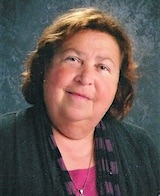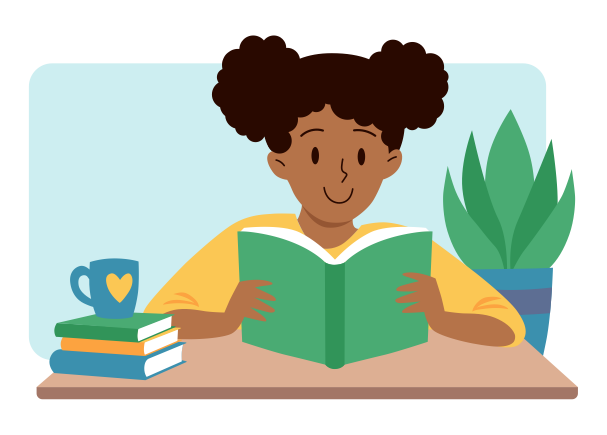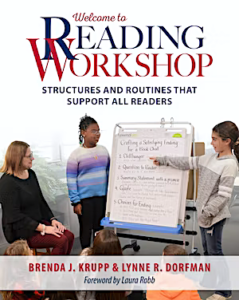Frequent Conferring with Readers Yields Rewards
By Brenda Krupp & Lynne R. Dorfman
“A reading conference with a child is a chance to listen to the thinking they are doing to make meaning from a text.” Krupp & Dorfman, Welcome to Reading Workshop (2023).
There are many reasons to hold quick one-to-one conferences during a reading workshop in the middle grades. Conferences help us learn about each individual reader in our classroom. We learn about their interests – what genres and authors they have read and what they are currently reading.
Through these brief meet-ups, we begin to build trust and promote reflection in a small, non-threatening setting as we share thoughts about the books we are reading. Laura Robb (1998) suggests that conferences build students’ confidence because they allow them to talk about and practice a strategy they have been taught. The reader has the opportunity to discuss what they have tried and how the strategy is working for them.
Reading conferences provide myriad opportunities to identify a problem and work through it together, providing immediate and ongoing feedback. Students can set short-term and long-term goals during these one-on-one conferences.
Teachers may use these conferences to evaluate a student’s progress, teach students how to self-evaluate, or simply to be a mentor and model for students so that they, in turn, can be more successful in peer- and self-conferences.
We encourage students to bring their reading response journals to these conferences to share their thinking about characters, setting, character motives, themes, connections to other texts, real-world events, experiences, and more.
Roving conferences and group get-togethers
In settings with rotating students, roving conferences during independent reading time may be used for quick check-ins, inviting students to share what they are thinking and feeling about their reading. It may be a chance to teach a student something new, something that may help them move forward as a reader.
Sometimes the teacher is taking some notes as readerly behavior (or the absence thereof) is observed. In a roving conference, a sticky note can be used to write a note to a student about what they are doing well or an author, genre, or strategy they may consider. This technique allows you to reach more students in a short amount of time if you see many students each day.
Sometimes we use a group conference if students have selected the same independent reading book or if they are all in need of some coaching for writing responses or engaging in reflection.
Working with a reading partner several times a week may help build rapport among the readers of your community and provide choice in scheduling these types of conferences. And the self-conference is an opportunity for readers to engage in a close reading of their independent reads and their written responses.
Some ways to get started
Inviting students to confer with you is an invitation to sit with you and have a conversation with just you. By giving the reader your undivided attention in a one-to-one conference, you signal that you care about their learning and want them to grow as a reader.
Invite students to share what they are thinking and/or feeling about what they are reading. Ask exploratory questions like “What was the most interesting part of the book so far?”; “Is this book a good choice for you? Why or why not?”; “What are you doing to make meaning as you are reading?”
Here is a brief process you can try as you confer with readers:
- Listen to the reader. You may have the reader retell what they have been reading, offer an opinion, share something from their response journal, or ask for specific help about how to navigate a new genre or use a strategy that was introduced in the minilesson.
- Using what you heard, make a decision about what to talk about with this reader, offering specific praise for what you notice them doing and then teach something new.
- Teach them something that will help them move forward as a reader.
- Use discussion points you’ve prepared in advance to address the student’s present goals.
- Help the reader craft a reading goal or decide to continue with the present goal.
( Krupp & Dorfman, Welcome to Reading Workshop, pg.120)
 Don’t forget to take some notes!
Don’t forget to take some notes!
Taking notes during a conference is important. It provides valuable information that will help you plan for instruction as well as assess students. Listen carefully to the student you are meeting with. Notice the ways they respond to your queries. What is this reader doing? What could help this reader move forward? The answers to these questions will help you formulate your notes and create an instructional plan.
There is no magical formula for note taking. How you take notes must work for you! Some teachers organize their notes into two columns – one for dated observational notes about the reader and the other for translating those notes into possible minilessons for the whole group.
Other options include jotting thoughts on sticky notes or mailing labels and then transferring them into a central notebook you keep. The key to effective notes is to remember what you observe the reader doing, what you see as possible teaching points for this reader, and what you taught the reader during the conference.
This documentation will help you keep track of what you have done and will help you assess how the reader is progressing with what you have taught during the conference.
Note-taking Tips for Reading Conferences
- Notice strategies the student uses as they describe the work they are doing in their reading.
Note how the reader approaches the text. Are they excited to talk about the text? Can they hold a conversation about the text? Do they address their feelings and/or make connections with the text? Do they offer an opinion about the text?
- Consider how the reader retells. Are they able to retell with ease? Do they focus on literal details when retelling? Are they making meaning from the text, citing evidence to support their thinking and interpretations?
- Is the reader using strategies you have previously taught?
- What do their body language and tone of voice tell you?
( Krupp & Dorfman, Welcome to Reading Workshop, pg.171)
Using conference notes to build minilessons
Conferences that are held regularly can lead to minilesson topics that will directly impact the readers in your classroom. The reading conference becomes a formative assessment when we take the time to reread and reflect on what we have learned by conferring with our students and then design instruction around this need.
Am I noticing a trend or is this student the only student with this need? Will I need to create a small group of students to address this need or will the whole class benefit from a minilesson on this topic?
Identify patterns that will help you decide if the minilesson will focus on fluency, vocabulary, or comprehension. By regularly reviewing your conference notes, looking for areas where explicit instruction is needed, you will develop minilessons that will be beneficial for many readers in your classroom.
Questions you might use during a conference
As you become more adept at the conferencing process, you’ll begin to jot down questions that have the most impact on your readers and yield the most valuable instructional information for your planning. Here are some questions we’ve found to be productive:
Monitoring for Understanding and Reading Identity:
- What can you do when you’re confused?
- Assess your reading list. Is it robust or limited? How so?
Becoming a Critical Reader:
- Will you decide to keep reading the book? Why or why not?
- What life lessons are offered?
Extending Reading Selections:
- Can I interest you in trying a new author? Genre? I have some of my favorites on this shelf.
- Have you read (title of book) by (name of author)? I think you would like it because… (name the genre and connect with an interest the student has or a book he has read that is similar).
Examining Problem-Solving Strategies:
- What problems have you had that I can help you with?
- Have you used a strategy that helped you solve a reading problem today? What did you do? How did it work?
(Appendix H, Questions for a Reading Conference in Welcome to Reading Workshop, p.199)
Some final thoughts about conferring
In our new book Welcome to Reading Workshop, we suggest that “a major focus of reading workshop is an emphasis on process over product. Conferring informs the practices the teacher will invite students to try. Listening to students talk about their reading enables you to help them choose books and can help create a love of reading while giving you opportunities to offer personalized instruction and feedback. Conferring positions the reader as the expert on their reading work; the most important person in the room at that moment in time.” (p. 6)
Reading conferences are conversations where we notice and note a student’s emerging strengths as a reader and have an opportunity to teach them something new that will move them forward. Conferring is not about the individual book, article, play, or poem the student has read. Instead, it is about gathering insights as we celebrate our students’ overall understandings of how reading can help them grow as individuals and how the reading act can add joy to their lives.
Brenda J. Krupp and Lynne R. Dorfman are the co-authors of Welcome to Reading Workshop: Structures and Routines That Support All Readers (Stenhouse, 2023; Foreword by Laura Robb) to be published in early August and now available for pre-order.
Brenda was a classroom teacher for 35 years, teaching second and third grade students in public school districts in southeastern Pennsylvania. She has also been a district K-5 professional development coach, a National Writing Project Fellow and co-facilitator for the Pennsylvania Writing & Literature Project’s invitational writing institute for 16 years. Brenda has also presented at state and national conferences on topics that include strategies for teaching reading and writing, assessment, managing a reading/writing workshop, and using book clubs to create community.
Lynne is an independent literacy consultant, a 20-year adjunct professor for Arcadia University, and a multi-book Stenhouse author, including Welcome to Writing Workshop (Stenhouse, 2019) with co-author Stacey Shubitz. She is a co-editor for PAReads: The Journal of Keystone State Literacy Association. Lynne’s other books include Grammar Matters: Lessons, Tips, and Conversations Using Mentor Texts, K–6; and A Closer Look: Learning More About Our Students with Formative Assessment, K–6; Mentor Texts: Teaching Writing Through Children’s Literature (2017 2nd ed); and Nonfiction Mentor Texts: Teaching Informational Writing Through Children’s Literature.







































